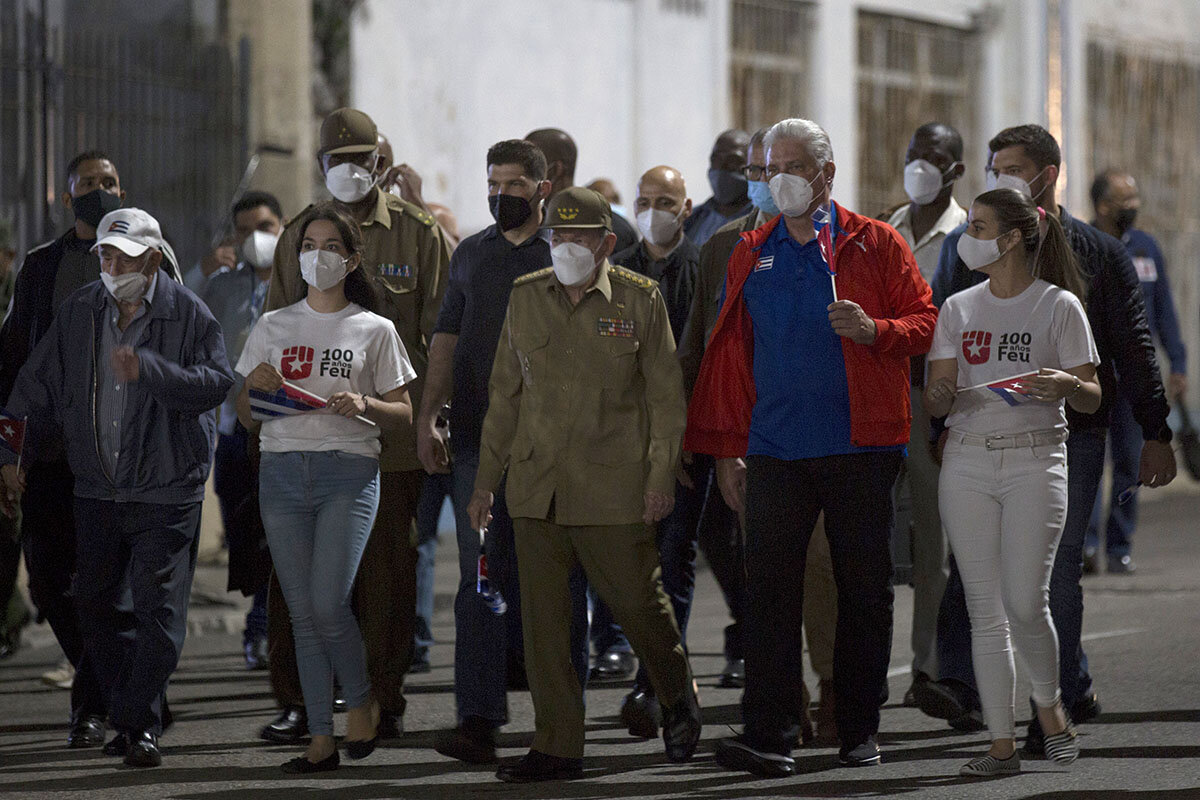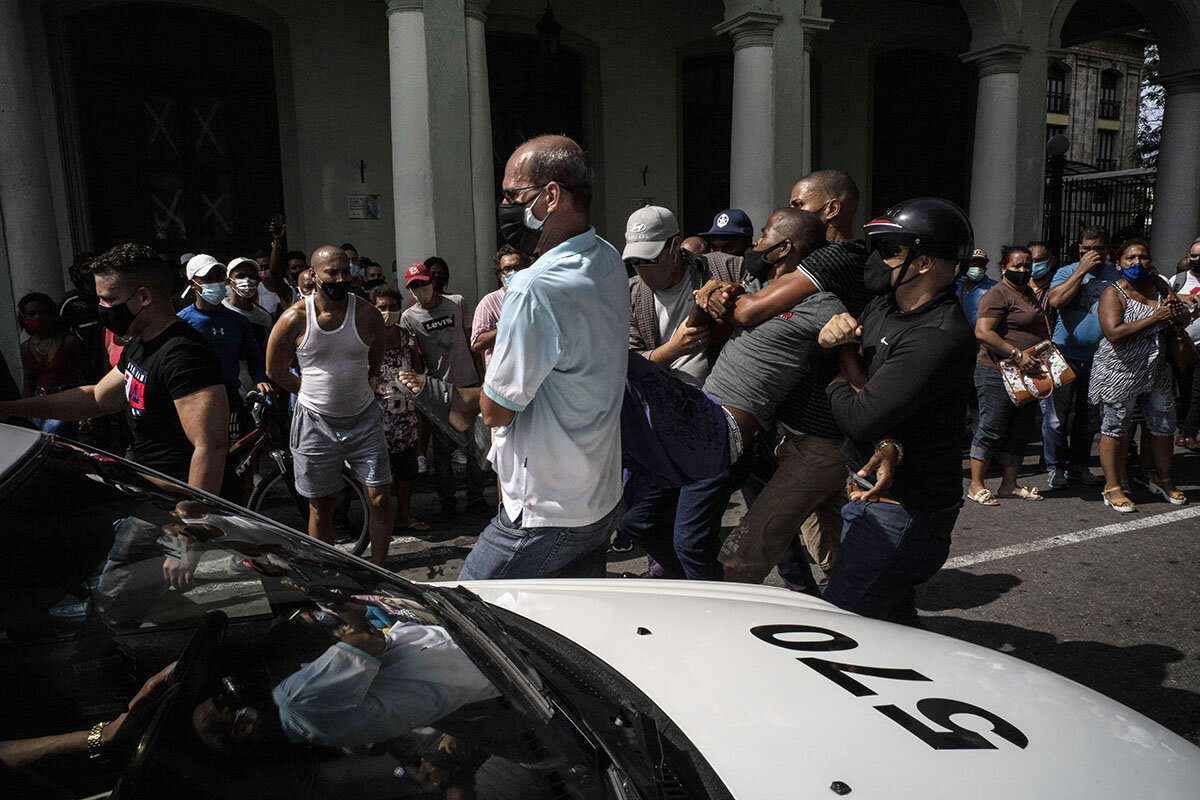Cuban kids don’t care about grandpa’s revolution – they want jobs
Loading...
| Mexico City and Havana
B√°rbara Farrat Guill√©n was hosting what she had expected to be an uneventful family gathering for her son Jonathan‚Äôs birthday last summer. But the young man happened to turn 17 on July 11, the day that¬Ýhistoric protests erupted unexpectedly across Cuba ‚Äì and the family is still dealing with the aftershocks.
The teen stepped out to look for his father, who had been surprised by the demonstrations on his way home. Six months later, Jonathan is still languishing in detention, suffering beatings, his mother says, and charged with inciting public disorder and attacking the authorities.
Scores of others have already been tried, and sentenced to as much as 30 years in jail on charges of sedition, for protesting peacefully against the government’s economic failings.
Why We Wrote This
Cuba’s young people are no longer moved by their government’s revolutionary rhetoric. Harsh punishment of peaceful demonstrators is likely to backfire.
The harsh punishments meted out by the courts have crushed any hope that President Miguel Díaz-Canel – Cuba’s first non-Castro leader since the revolution – might usher in greater civil liberties. They also risk backfiring, suggests Manuel de la Cruz Pascual, a young writer and independent journalist in Havana.
“What Díaz-Canel is doing with his policies of repression and these mass trials of protesters is generating and empowering more dissidents,” he says.
Sebastian Arcos, associate director of the Cuban Research Institute at Florida International University in Miami, agrees that in the long term the trials are unlikely to intimidate the young Cubans at the forefront of last July’s demonstrations.
“They want people to be very afraid ... but it’s a different world” from Fidel Castro’s Cuba, says Mr. Arcos, a former Cuban political prisoner. “There’s a chance they’re too late.”
Young people’s greater access to the internet, fewer personal ties to Mr. Castro’s revolution, and the sense that they have very little to lose are shifting the way they look at their government. July 11, suggests Mr. de la Cruz, marked a “big awakening.”
Revolution’s fading appeal
The countrywide July 11¬Ýprotests, broadcast on social media, attracted many young people who blasted the streets with reggaeton beats.
They were motivated partly by economic grievances; inflation hit 70% last year, according to government figures, and the average monthly wage is the equivalent of $163. But protesters were also openly “demanding freedom and the resignation of the government,” recalls Mr. Arcos. “That’s a total breakdown of the regime’s rules.”
That may explain the government’s heavy-handed reaction, which has drawn criticism from the European Union, the United States, and international human rights organizations. Over 1,350 people are in jail or under house arrest for their roles in the July 11 protests, according to Laritza Diversent, director of Cubalex, a U.S.-based legal aid group tracking the detentions.
Some families have been assigned lawyers by the government, but Yudinela Caridad Castro Perez, whose son Rowland is facing a 23-year prison sentence for having joined the protests, does not expect much of his attorney. “It’s decorative, an attempt to legitimize these trials when the government is judge and jury,” she scoffs.
Economic uncertainty drew many of the demonstrators, believes Ms. Diversent. “You can’t plan your life. Not teens, not their parents, not their grandparents can navigate a path toward a dignified life. The economic conditions are horrendous,” she says.
And that mood won’t change, she predicts, “if there is no change in policies. The majority of protesters come from poverty. This won’t be resolved by ideology.”
Not that the government’s communist ideology has much appeal to young Cubans anymore, 60 years after Mr. Castro’s guerrillas overthrew a military dictatorship.
The revolution “is something that happened so long ago, and it’s a word that’s just completely overused in Cuba,” says Emily Telly, who is in her early 30s, unemployed, and living in Havana. “I don’t feel any connection to the revolution; it doesn’t make any sense anymore, especially to us” younger people.
“All of these measures are done to intimidate us,” she says of the trials, “but they are going too far. The government isn’t even following the constitution. But Cubans today, we don’t have much to lose.”
“All we want is change”
The government crackdown has sown seeds of dissent across older generations, too.
“It’s difficult for a mother to see her son behind bars for something that in any other country in the world – a peaceful protest – is considered normal,” says Teresa Rodríguez Simón, three of whose children were detained in the days following last summer’s protest, accused of ties to foreign powers.
‚ÄúAll we‚Äôre asking of the comandante¬Ý[President D√≠az-Canel] is to analyze this situation, reflect on what happened and why,‚Äù she says. ‚ÄúLook at what pushed so many people and so many youth to protest.‚Äù
Jonathan‚Äôs mother, meanwhile, has become a political activist for the first time in her life, marching in public with other ‚ÄúLadies in White‚Äù ‚Äì an opposition movement founded by female relatives of jailed and ‚Äúdisappeared‚Äù dissidents.¬Ý¬Ý
“There are mothers like me who aren’t keeping quiet, who won’t let it drop that our children are in prison,” she says. Though afraid for her son, “the fear I have right now is not so much a fear of the government because they always do the same thing,” she explains. “I won’t let that scare me anymore.
“We no longer want the revolution they’re selling us,” she says. “All we want is change.”
For Mr. de la Cruz, the writer, Mr. Díaz-Canel’s invocation of revolutionary values is a smokescreen. “The president’s actions against the protesters have nothing to do with this utopian revolution, with the values of conserving the revolution, not only as an idea but as a social project,” he argues. “He’s simply hiding behind these trials trying to hold onto power.”
And the president can expect more challenges in the future, Mr. de la Cruz expects.
“The political and economic conditions on the island have not changed,” he says, “and with more government surveillance and no way to escape, the conditions have been created for another protest in the same vein as July.”






